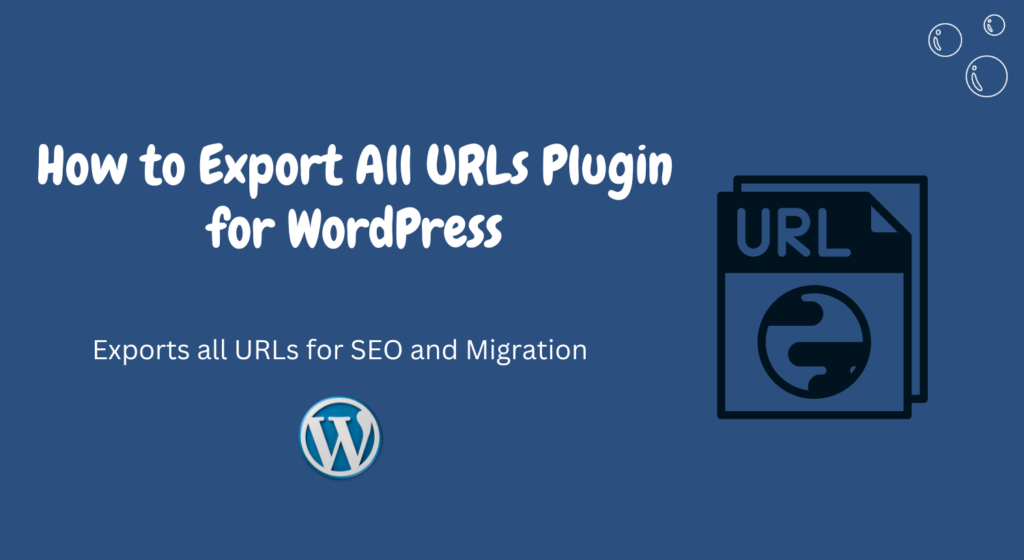WordPress is one of the most popular content management systems globally, empowering millions of websites.
Managing URLs effectively within WordPress is crucial for search engine optimization (SEO) and seamless website migration.
Fortunately, with the right tools, such as URL export plugins, this task becomes significantly easier.
Understanding URL Exporting
URL export plugins are tools designed to extract and export all URLs from a WordPress website.
These plugins traverse the site’s structure, compiling a comprehensive list of URLs, including posts, pages, categories, and custom post types.
This exported data can then be used for various purposes, such as SEO analysis, redirection mapping, and website migration.
Choosing the Right Plugin
When selecting a URL export plugin for WordPress, several factors should be considered.
These include the plugin’s compatibility with your WordPress version, user reviews and ratings, support for custom post types, and ease of use.
Popular options such as “All in One SEO Pack” and “Yoast SEO” offer robust URL exporting functionalities alongside their primary SEO features.
Installation and Setup
Installing a URL export plugin is a straightforward process.
Simply navigate to the WordPress dashboard, select “Plugins,” then “Add New.”
Search for your chosen plugin, install it, and activate it.
Once activated, you may need to configure the plugin settings according to your preferences, such as specifying which URLs to include or exclude from the export.
Exporting URLs for SEO
Exporting URLs is a vital component of any SEO strategy.
By having access to a comprehensive list of URLs, website owners, and SEO professionals can identify and rectify issues such as broken links, duplicate content, and crawl errors.
Additionally, exported URL data enables in-depth analysis of site structure and content hierarchy, leading to more effective optimization efforts.
Exporting URLs for Migration
During website migration, preserving URL structure and redirecting old URLs to new ones is crucial for maintaining SEO rankings and user experience.
URL export plugins facilitate this process by generating a detailed list of all existing URLs, which can then be used to create redirection rules and mapping tables.
This ensures that visitors are seamlessly redirected to the appropriate pages on the new site.
Advanced Features
In addition to basic URL exporting capabilities, many plugins offer advanced features to further enhance website management and optimization.
These may include bulk editing of URLs, integration with third-party SEO tools, scheduled exports, and automatic generation of XML sitemaps.
Common Issues and Troubleshooting
Despite their usefulness, URL export plugins may encounter issues such as compatibility conflicts with other plugins or themes, limitations imposed by hosting providers, or technical errors during the export process.
Fortunately, most issues can be resolved by following troubleshooting steps provided by the plugin developer or seeking assistance from WordPress support forums.
Best Practices
To make the most of URL export plugins, website owners should adhere to best practices such as regularly exporting URL data, keeping track of changes to site structure, maintaining a clean and organized permalink structure, and regularly monitoring SEO performance metrics.
Case Studies
Numerous case studies illustrate the effectiveness of URL export plugins in improving SEO and streamlining website migration processes.
From small businesses to large enterprises, organizations have reported significant improvements in search engine rankings, website traffic, and user engagement after implementing URL export strategies.
Future Trends
As search engine algorithms evolve and website technologies advance, the importance of URL management and export plugins is expected to grow.
Future trends may include more sophisticated URL analysis tools, AI-driven SEO optimization strategies, and increased emphasis on user-centric website design.
Conclusion
In conclusion, URL export plugins are invaluable tools for WordPress users seeking to optimize their websites for search engines and streamline the migration process.
By exporting all URLs, website owners gain valuable insights into site structure, content organization, and SEO performance, ultimately leading to improved rankings, increased traffic, and better user experience.
FAQs
- What is a URL export plugin, and why do I need it?
- A URL export plugin extracts and exports all URLs from your WordPress website, aiding in SEO analysis, website migration, and URL management.
- Can I use URL export plugins for website migration?
- Yes, URL export plugins are essential for preserving URL structure and ensuring seamless redirection during website migration.
- Are there any free URL export plugins available for WordPress?
- Yes, several free URL export plugins offer basic functionality for exporting URLs. However, premium plugins often provide more advanced features and support.
- How frequently should I export URLs from my WordPress site?
- It is advisable to export URLs regularly, especially before making significant changes to your website’s structure or content.
- Do URL export plugins affect website performance?
- While URL export plugins may consume some server resources during the export process, they typically have minimal impact on website performance when configured correctly.


